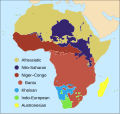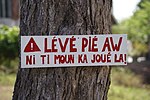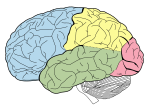Language change is variation over time in a language's features. It is studied in several subfields of linguistics: historical linguistics, sociolinguistics... 24 KB (2,667 words) - 01:17, 4 April 2024 |
transcription delimiters. A sound change, in historical linguistics, is a change in the pronunciation of a language. A sound change can involve the replacement... 17 KB (2,331 words) - 22:34, 9 April 2024 |
Rhotacism (redirect from Rhotacism (language change)) common may be of /z/ to /r/. When a dialect or member of a language family resists the change and keeps a /z/ sound, this is sometimes known as zetacism... 19 KB (1,885 words) - 03:45, 20 February 2024 |
Semantic change (also semantic shift, semantic progression, semantic development, or semantic drift) is a form of language change regarding the evolution... 26 KB (3,043 words) - 08:22, 21 March 2024 |
 | linguistics, language death occurs when a language loses its last native speaker. By extension, language extinction is when the language is no longer... 36 KB (4,193 words) - 21:17, 21 April 2024 |
 | The number of languages natively spoken in Africa is variously estimated (depending on the delineation of language vs. dialect) at between 1,250 and 2... 78 KB (5,578 words) - 20:49, 30 April 2024 |
linguistics, phonological change is any sound change that alters the distribution of phonemes in a language. In other words, a language develops a new system... 39 KB (5,445 words) - 23:59, 19 September 2023 |
Language Change: Progress or Decay? is a book on language change by Jean Aitchison in which the author concludes that language change is neither a process... 3 KB (123 words) - 15:19, 10 April 2024 |
Historical linguistics (redirect from Changes in language over time) language change over time. Principal concerns of historical linguistics include: to describe and account for observed changes in particular languages... 22 KB (2,554 words) - 01:45, 26 April 2024 |
Linguistics (redirect from Study of language) of language, historical research today still remains a significant field of linguistic inquiry. Subfields of the discipline include language change and... 82 KB (9,260 words) - 17:37, 16 April 2024 |
On Explaining Language Change is a 1980 book by Roger Lass in which the author examines various aspects of language change. The book was reviewed by Suzanne... 3 KB (142 words) - 15:28, 31 March 2023 |
Prestige (sociolinguistics) (redirect from Prestigious language) new language, known as a creole, language contact can result in changes, such as language convergence, language shift or language death. Language convergence... 44 KB (5,636 words) - 18:51, 12 March 2024 |
 | climate change describes global warming—the ongoing increase in global average temperature—and its effects on Earth's climate system. Climate change in a... 314 KB (28,010 words) - 02:33, 1 May 2024 |
proto-language is a postulated ancestral language from which a number of attested languages are believed to have descended by evolution, forming a language... 13 KB (1,689 words) - 00:06, 11 January 2024 |
In language change, analogical change occurs when one linguistic sign is changed in either form or meaning to reflect another item in the language system... 9 KB (1,167 words) - 08:55, 7 April 2024 |
Language convergence is a type of linguistic change in which languages come to resemble one another structurally as a result of prolonged language contact... 9 KB (1,023 words) - 01:01, 20 October 2023 |
 | Eggcorn (section Language change) to linguists as they not only show language changing in real time, but can also shed light on how and why the change occurs. The term egg corn (later contracted... 13 KB (1,179 words) - 22:41, 7 March 2024 |
Word taboo (redirect from Taboo Language) called taboo language, language taboo or linguistic taboo is a kind of taboo that involves restricting the use of words or other parts of language due to social... 13 KB (1,587 words) - 14:12, 18 September 2023 |
 | A creole language, or simply creole, is a stable natural language that develops from the process of different languages simplifying and mixing into a new... 71 KB (8,015 words) - 17:10, 25 April 2024 |
Language shift, also known as language transfer or language replacement or language assimilation, is the process whereby a speech community shifts to... 81 KB (9,356 words) - 17:26, 30 April 2024 |
 | A language isolate is a language that has no demonstrable genetic relationship with another language. Basque in Europe, Ainu in Asia, Sandawe in Africa... 69 KB (4,407 words) - 14:49, 25 April 2024 |
 | Cognate (redirect from Language overlap) descent from an etymological ancestor in a common parent language. Because language change can have radical effects on both the sound and the meaning... 10 KB (1,006 words) - 06:06, 22 February 2024 |
 | The Salishan (also Salish; /ˈseɪ.lɪʃ/) languages are a family of languages of the Pacific Northwest in North America (the Canadian province of British... 35 KB (3,428 words) - 08:59, 1 March 2024 |







